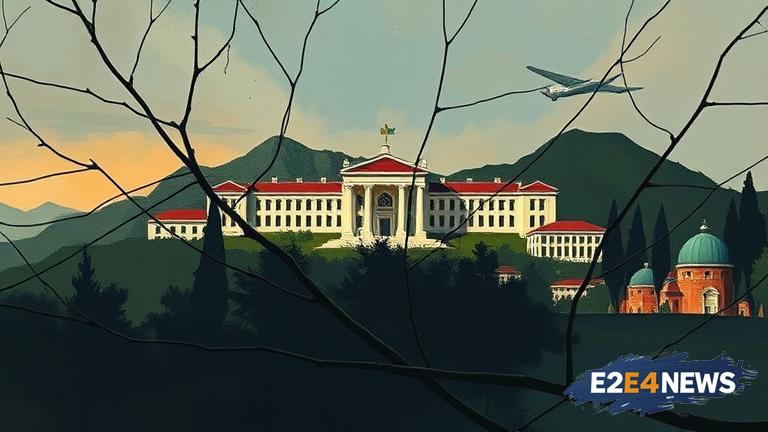The University of Cape Town, one of South Africa’s most prestigious institutions, is currently embroiled in a controversy that has sparked heated debates about the role of politics in academia. The issue at hand is the alleged interference by the African National Congress (ANC) in the university’s affairs, which has raised concerns about academic freedom and institutional governance. The controversy began when the university’s council voted to remove a statue of Cecil Rhodes, a British colonialist, from its campus. However, the decision was met with resistance from some quarters, including the ANC, which has been accused of trying to exert its influence over the university. The ANC has denied these allegations, but the incident has highlighted the complex and often fraught relationship between politics and academia in South Africa. The university’s vice-chancellor, Mamokgethi Phakeng, has been at the center of the controversy, and has faced criticism from some quarters for her handling of the situation. Despite the challenges, Phakeng has remained committed to upholding the values of academic freedom and institutional autonomy. The controversy has also sparked a wider debate about the role of universities in society, and the need for institutions to remain independent and free from political interference. The University of Cape Town is not alone in facing these challenges, as many other institutions in South Africa are also grappling with similar issues. The controversy has highlighted the need for a nuanced and informed discussion about the relationship between politics and academia, and the importance of protecting academic freedom and institutional autonomy. The university’s council has established a task team to investigate the allegations of political interference, and to make recommendations for improving governance and oversight. The task team’s report is expected to be released soon, and will likely provide valuable insights into the challenges facing the university. In the meantime, the university community remains divided, with some calling for greater transparency and accountability, while others are pushing for more radical reforms. The controversy has also sparked a wider debate about the legacy of colonialism and the need for universities to confront their own histories and biases. The University of Cape Town has a long and complex history, and its campus is home to many symbols and monuments that reflect its colonial past. The controversy over the Rhodes statue is just one example of the many challenges that the university faces in coming to terms with its history and its place in society. The university’s student body is also deeply divided, with some students calling for more radical action to address issues of racism and inequality. The controversy has highlighted the need for greater engagement and dialogue between different stakeholders, including students, staff, and members of the broader community. The university’s management has pledged to engage with all stakeholders and to work towards finding solutions that balance the needs and interests of different groups. The controversy is a reminder that universities are complex and multifaceted institutions, and that they face many challenges in fulfilling their mission to advance knowledge and understanding. The University of Cape Town is committed to upholding the values of academic freedom and institutional autonomy, and to providing a safe and inclusive environment for all members of its community. The controversy has sparked a wider debate about the role of universities in society, and the need for institutions to remain independent and free from political interference. The university’s council has reaffirmed its commitment to these values, and has pledged to work towards finding solutions that balance the needs and interests of different stakeholders. The controversy is a complex and multifaceted issue, and it will likely take time and effort to resolve. However, the university community remains committed to finding solutions that uphold the values of academic freedom and institutional autonomy, and that promote a safe and inclusive environment for all. The University of Cape Town is a world-renowned institution, and its reputation for academic excellence and intellectual freedom is at stake. The controversy has highlighted the need for greater transparency and accountability, and for more nuanced and informed discussions about the relationship between politics and academia. The university’s management has pledged to engage with all stakeholders and to work towards finding solutions that balance the needs and interests of different groups. The controversy is a reminder that universities are complex and multifaceted institutions, and that they face many challenges in fulfilling their mission to advance knowledge and understanding. The University of Cape Town is committed to upholding the values of academic freedom and institutional autonomy, and to providing a safe and inclusive environment for all members of its community. The controversy has sparked a wider debate about the role of universities in society, and the need for institutions to remain independent and free from political interference. The university’s council has reaffirmed its commitment to these values, and has pledged to work towards finding solutions that balance the needs and interests of different stakeholders. The controversy is a complex and multifaceted issue, and it will likely take time and effort to resolve. However, the university community remains committed to finding solutions that uphold the values of academic freedom and institutional autonomy, and that promote a safe and inclusive environment for all. The University of Cape Town is a world-renowned institution, and its reputation for academic excellence and intellectual freedom is at stake. The controversy has highlighted the need for greater transparency and accountability, and for more nuanced and informed discussions about the relationship between politics and academia. The university’s management has pledged to engage with all stakeholders and to work towards finding solutions that balance the needs and interests of different groups. The controversy is a reminder that universities are complex and multifaceted institutions, and that they face many challenges in fulfilling their mission to advance knowledge and understanding. The University of Cape Town is committed to upholding the values of academic freedom and institutional autonomy, and to providing a safe and inclusive environment for all members of its community.
